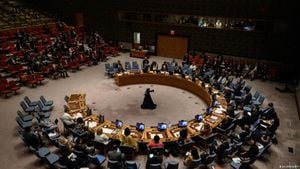On the heels of the recent German federal elections, Friedrich Merz, the chairman of the Christian Democratic Union (CDU) and anticipated future Chancellor, has extended an official invitation to Israeli Prime Minister Benjamin Netanjahu, raising eyebrows due to the existing international warrant for Netanjahu’s arrest issued by the International Criminal Court (ICC).
During their phone conversation on election night, Merz expressed gratitude for Netanjahu's congratulatory message and indicated plans for future cooperation. He stated, "I think it’s ridiculous to entertain the idea of denying the Israeli Prime Minister access to Germany. He will be able to come to Germany, and we will find means for him to visit without fear of arrest," according to reports from Netanjahu’s office.
Netanjahu’s government has confirmed this invitation, deeming it as “an open challenge” to the ICC, which issued warrants last November for both him and former Israeli Defense Minister Joav Gallant concerning alleged crimes against humanity related to actions during the Gaza conflict. Both men are accused of involvement in war crimes.
Merz's commitment to facilitate Netanjahu’s visit has triggered considerable debate within Germany and beyond. Critics, including representatives from factions like the Left Party, argue this stance undermines international law principles. Left y leader Jan van Aken stated, "If Netanjahu visits Germany, he must be arrested. This is international law. An arrest warrant must be executed," illustrating the serious legal ramifications and potential international fallout surrounding Merz’s announcement.
The ICC has emphasized member states' legal obligations to act on its warrants, asserting, "States must not ignore the decisions of the Court." The tension between maintaining strong diplomatic ties with Israel and adhering to international legal standards presents a significant challenge for Germany moving forward.
While Merz has been clear about his intentions, he faces scrutiny over how this will be reconciled with Bundestag expectations and constitutional obligations. SPD politician and former Minister of State Michael Roth asserted the importance of respecting ICC procedures, saying, "The independence of the ICC is central and must be respected as part of the rules we abide by as international players."
This invitation and its potential execution come at a time of heightened geopolitical sensitivity surrounding the Middle East. Many critics view the invitation as normalization of actions deemed criminal under international law, potentially setting dangerous precedents. Merz's actions are seen as reinforcing Israel's controversial military policies, particularly those executed during conflicts involving Palestinian unrest.
Netanjahu’s government has consistently argued its military actions are necessary for national defense, claiming they target terrorist operations aligned with Hamas and other groups. Despite these claims, public outcry from various political spectrums stresses the dire human impact of military operations, especially during recent escalations culminating from the Israel-Palestine conflict.
Within Israel, there are also mixed responses to international scrutiny, with many citizens standing firm with their government’s military policies, insisting on Israel’s right to defend itself against perceived existential threats. Merz's invitation, perceived as shared support from Germany, has been welcomed by some but fiercely criticized by human rights activists and global leaders advocating for accountability.
Analysts disclose the importance of Germany's delicate position as it seeks to navigate its historical responsibilities and its commitments as part of global efforts to uphold human rights and legal norms. With the ground shaking under the complexity of international relations surrounding the Israel-Palestinian conflict, Merz's pledge likely signifies broader ideological and strategic trends either supporting or undermining international humanitarian laws.
Even within the CDU, leaders express wariness about the diplomatic and legal ramifications of Merz's declarations. A call for nuanced approaches appears necessary, emphasizing the importance of constructive dialogue between Germany and Israel whilst respecting legally binding frameworks established by the ICC.
Moving forward, as the German government transitions and Merz positions himself to lead, the forthcoming diplomatic engagements with Israel will be closely watched, with many interested parties advocating for sustainable resolutions to tensions rooted deeply both historically and contemporarily. This invitation serves as not just a political gesture but potentially as the litmus test for Germany’s adherence to internationally accepted legal protocols.



